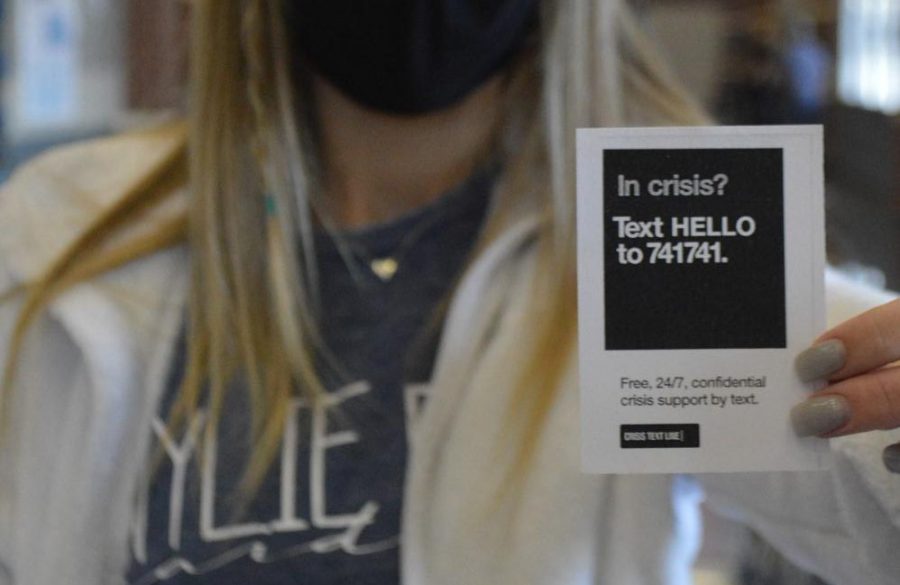September marks prevention month
Counselors provide help for those in need
photo credit: Sammy Harris
Call somebody who cares \\ Counselor Mrs. Mandy Coers highly recommends that students use the text hotline when having harmful or suicidal thoughts. She has more information available in her office. “I like that the Crisis Text Line is a text,” Mrs. Coers said. “Studies have shown that it’s hard for teenagers to pick up the phone and talk.”
September 29, 2020
To prioritize the needs of students with mental illness and emotional problems, the district has placed two student support advocates at each high school. Along with these advocates, counselors are another resource for students suffering from emotional stress.
All are knowledgeable about serious topics such as suicide.
Student Support Advocate Mrs. Kim Combest and Counselor Mrs. Mandy Coers give professional help and spread suicide awareness across campus.
“It’s a myth that if you mention suicide, you plant the idea [in someone’s mind],” Mrs. Combest said. “By honestly and openly expressing your concerns, you’ll send an important message that you care and understand.”
Counseling staff members push for more communication and education about topics such as suicide, and they greatly believe that it would cause more awareness.
“We could roll out things that don’t have the actual suicide message on it,” Ms. Coers said, “but it would branch onto the idea.”
Remote learners may think there is no one they can communicate with about their mentality; however, there are resources available to everyone, in person and remote.
“I like that the Crisis Text Line is a text,” Mrs. Coers said. “Studies have shown that it’s hard for teenagers to pick up the phone and talk.”
The crisis hotline allows for people of all ages to feel safe and comfortable with who they’re talking to, and the text hotline allows for the same amount of confidentiality, but users don’t have to physically talk to somebody.
Mrs. Combest even offers advice to parents about connecting with their children and how to make children feel like the parent is present in their world.
“Parents can be tempted to shut down an upsetting conversation by saying, ‘I don’t want to hear those things,’ or ‘I had a hard time as a teen, but I got over it,’ Instead, say, ‘Tell me more about how you’re feeling,’ then listen,” Mrs. Combest said.
Reaching out and personally connecting with students are things that the counseling staff works to achieve to help those with mental illness feel safe and comfortable enough to talk about anything. They check on at-risk students routinely.
“I will look at their grades and attendance, and check on them,” Mrs. Coers said, “[I’ll] Look at those signs, because I don’t have that student in a class.”
Mrs. Combest helps parents by suggesting they reach out to their children and make them feel seen and heard at home.
“As a parent, spend extra time with your child. Even watching TV or playing video games together sends a signal that you’re there,” she said.
Student support advocates are located in the counseling center, and are available to talk, anytime a student needs them.
“It’s fortunate that we have two of them, but it’s unfortunate that we need two of them,” Mrs. Coers said.
For free, 24/7, confidential crisis support, text HELLO to 741741.


